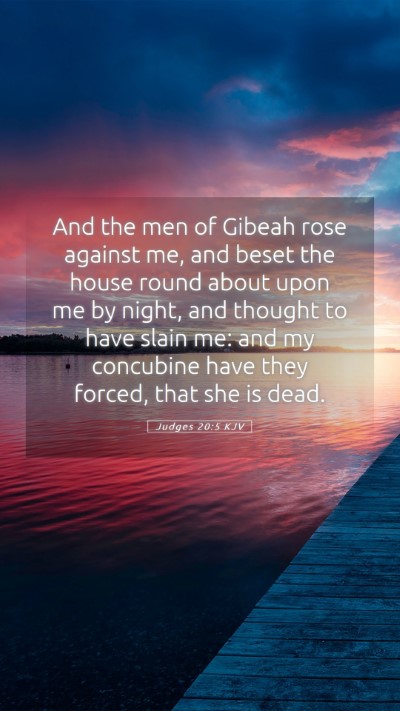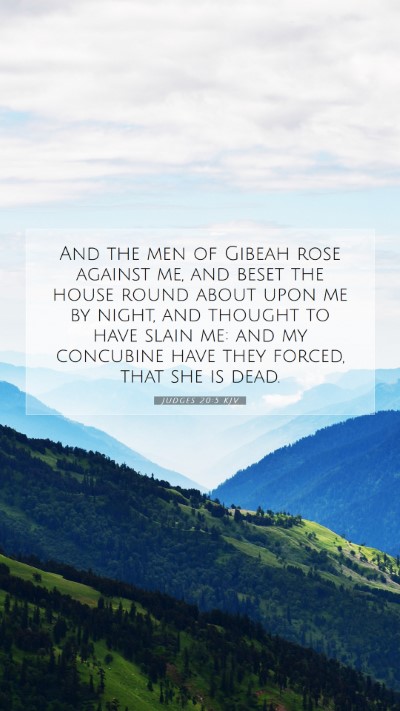Bible Verse Commentary on Judges 20:5
Verse Reference: Judges 20:5 - "And the men of Gibeah rose against me and beset the house round about upon me by night, and thought to have killed me: and my concubine have they forced, that she is dead."
Contextual Background
The Book of Judges documents a turbulent time in Israel's history, a period characterized by cycles of sin, oppression, repentance, and deliverance. Judges 20 recounts a pivotal incident involving the tribe of Benjamin and the Levite's concubine, which leads to civil war among the tribes of Israel.
This particular verse captures a moment of grave injustice suffered by the Levite and serves as a catalyst for the ensuing conflict. The Levite's testimony highlights the brutality and moral decline present in Israel during this period.
Interpretation and Meaning
1. The Rising Against: According to Matthew Henry, the phrase "rose against me" depicts how the men of Gibeah acted with intention and malice. The incident serves as a stark reminder of how quickly communities can turn against their own, reflecting the moral corruption that can arise when people stray from God’s commandments.
2. The Night Attack: Albert Barnes emphasizes the significance of the attack occurring at night, suggesting that it represents treachery and cowardice. Darkness often symbolizes evil deeds, and the stealthy nature of their approach underscores the gravity of the sin committed against the Levite and his concubine.
3. The Forced Concubine: Adam Clarke notes that the Levite’s mention of his concubine being 'forced' speaks to the horrific nature of the assault. It also initiates a discussion on the societal norms regarding women during biblical times, raising questions about their treatment and the consequences of moral decay within the society.
Cross-References
- Judges 19:22-30: The background of the incident with the Levite and his concubine.
- Genesis 19:4-5: The story of Sodom, where men surrounded the house seeking to harm Lot and his guests.
- 2 Samuel 13: The account of the rape of Tamar by Amnon, showcasing further examples of moral failure in Israel's history.
Application of the Verse
Understanding this verse requires contemplating the severe moral implications and the societal consequences that arise when individuals and communities forsake divine law. It compels contemporary readers to consider:
- Civil Responsibility: How do we react to injustice in our own communities?
- Moral Accountability: In what ways can we prevent the moral decay seen in the days of the Judges in our lives today?
- Advocacy for the Vulnerable: What can we do to protect those who are weaker or marginalized in society?
Bible Study Insights
This passage offers profound insights into the themes of justice, community response to moral failure, and the implications of collective sin. Engaging in Bible study groups or utilizing Bible study tools can enhance one's understanding of such difficult Bible passages.
Conclusion
Judges 20:5 serves as a poignant reminder of the consequences of abandoning God's laws and the importance of justice and accountability within communities. By reflecting on the historical context, understanding the commentary from scholars, and considering personal application, believers can glean crucial lessons for their lives today.


